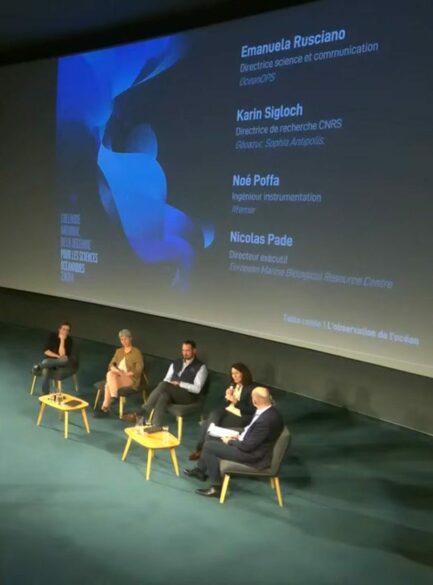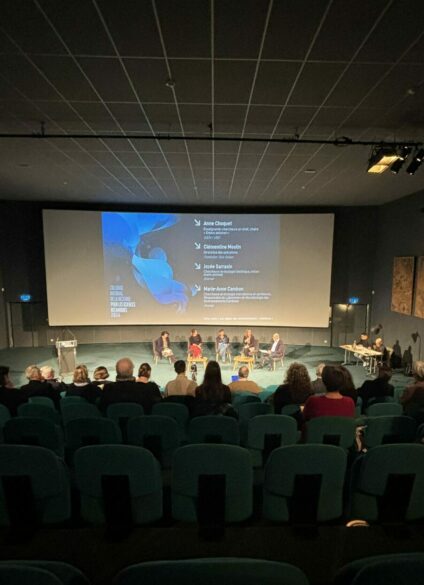National Conference for the United Nations Decade of Ocean Sciences
From 12 to 13 March 2023, Brest hosted the National Conference for the United Nations Decade of Ocean Sciences for Sustainable Development. This crucial event brought together experts and key players to discuss the advances and challenges involved in preserving and enhancing the oceans. The Race for Water Foundation was present at this event, and here is a detailed summary of the discussions and the main points raised.
Opening of the conference
Guillaume Thieriot, Project Manager at the Directorate-General for Maritime Affairs, Fisheries and Aquaculture, opened the conference. He presented the Year of the Sea programme, announced by President Emmanuel Macron, which will run from September 2024 to September 2025. This programme is structured around five major themes:
- Biodiversity
- Deep seabed (France supports a total ban on deep seabed mining)
- IUU fishing (illegal, unreported and unregulated)
- Plastic pollution
- Decarbonisation of maritime transport
The main objectives of this programme are
- Get to know and love the sea.
- Promote the sea and its products by providing resources.
- Take action and plan ahead: work together and mobilise the public.
The programme is based on three pillars of action:
- Events and communication: with the ‘An ocean of knowledge’ project.
- Participation: through the labelling of projects and a call for projects planned for next spring.
- Education: passing on knowledge through the ‘Generation Sea’ project.
"Ocean observation"
This roundtable brought together several experts who shared their projects and discoveries:
Emanuela Rusciano (OceanOps) presented a global oxygen database project for the oceans as part of the “GOOS” program. Since the 1950s, a 2% deoxygenation has been observed, with projections of an additional loss of 3 to 4%. The project aims to install oxygen sensors on 80% of the 4000 Argo floats by 2030 and create a global atlas of oxygen data.
Nicolas Pade (EMO BON) emphasized the importance of marine biodiversity observation using molecular methods targeting the DNA of microorganisms.
Karin Sigloch (CNRS) presented the Eurscop Ocean project, which extends the seismic network in the oceans using drifting floats to capture acoustic waves from the seabed.
Noé Poffa (Ifremer) highlighted the international Argo program and its OneArgo project, which aims to improve the accuracy of oceanographic measurements.
In conclusion, this roundtable highlighted the crucial importance of ocean observation to understand ongoing changes and take appropriate preservation measures. International collaboration and the development of new technologies are essential to address the challenges related to ocean health.


"The challenges of extreme marine ecosystems"
This round table explored the challenges associated with extreme marine ecosystems:
Marie-Anne Cambon and Jozée Sarrasin (Ifremer) discussed seabed exploration, highlighting the importance of the Nautile submarine in reaching depths of 6,000 metres. They highlighted the wealth of biodiversity, energy and minerals in the abyss, with a growing interest in polymetallic nodules. The Deep Rest programme studies hydrothermal fields to understand the life cycle of deep-sea species.
Clémentine Moulin (Fondation Tara Océan) stressed the need for legislation on mineral resources in the high seas and presented the Tara Polar Station, dedicated to biological missions in the Arctic, underlining the scientific and legislative importance of this area.
Anne Choquet (IUEM/UBO) spoke about legislation in polar zones, mentioning the freeze on territorial claims in the Antarctic and the need to regulate tourism to prevent risks. France favours observation and understanding of the seabed before any exploitation.
In conclusion, the round table highlighted the scientific, legislative and conservation challenges associated with extreme ocean environments. The French government has allocated €1 billion to study and preserve the poles and €300 million to research and protect the seabed.
In conclusion
Oona and Jeanne from the Race for Water foundation attended the National Ocean Science Conference at Océanopolis. The conference was an enriching platform for sharing knowledge, discussing current and future challenges, and exploring opportunities for collaboration in protecting and enhancing the oceans. We will continue to follow developments closely and contribute actively to these initiatives, reinforcing our commitment to the sustainability and preservation of marine ecosystems.